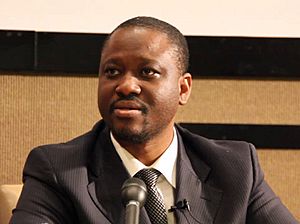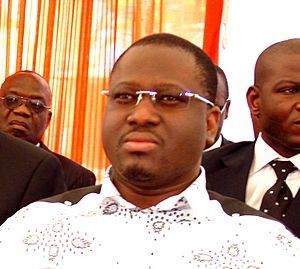Guillaume Soro facts for kids
Quick facts for kids
Guillaume Soro
|
|
|---|---|

Soro in 2011
|
|
| President of the National Assembly | |
| In office 12 March 2012 – 8 February 2019 |
|
| Preceded by | Mamadou Koulibaly |
| Succeeded by | Amadou Soumahoro |
| 7th Prime Minister of the Ivory Coast | |
| In office 4 April 2007 – 13 March 2012* |
|
| President | Laurent Gbagbo Alassane Ouattara |
| Preceded by | Charles Konan Banny |
| Succeeded by | Jeannot Ahoussou-Kouadio |
| Minister of Defence | |
| In office 11 April 2011 – 13 March 2012 |
|
| Preceded by | Amani N'Guessan |
| Succeeded by | Alassane Ouattara |
| Leader of the Patriotic Movement | |
| Assumed office 20 December 2005 |
|
| Preceded by | Party established |
| Personal details | |
| Born | 8 May 1972 Diawala, Ivory Coast |
| Political party | Patriotic Movement |
|
|
Guillaume Kigbafori Soro (born 8 May 1972) is a politician from the Ivory Coast. He served as the Prime Minister of Côte d'Ivoire from April 2007 to March 2012. Before becoming Prime Minister, Soro led a political group called the Patriotic Movement of Côte d'Ivoire. Later, he became the Secretary-General of another group known as the New Forces. In March 2012, Soro was chosen to be the President of the National Assembly of Côte d'Ivoire, which is like the country's parliament. He left this role in February 2019.
Contents
About Guillaume Soro
Guillaume Soro was born on May 8, 1972. He comes from a group of people called the Sénoufo in northern Côte d'Ivoire, specifically from a town called Ferkessédougou. He is of the Catholic faith. His father was also involved in politics, as a member of the Democratic Party of Côte d'Ivoire (PDCI).
Role in the Ivorian Civil War
Guillaume Soro led a group called the Patriotic Movement of Côte d'Ivoire (MPCI). In September 2002, this group was involved in a conflict against President Laurent Gbagbo. This conflict led to what is known as the Ivorian Civil War.
In December 2002, Soro's MPCI joined with two other groups. These groups were the Ivorian Popular Movement of the Great West (MPIGO) and the Movement for Justice and Peace (MJP). Together, they formed a larger group called the New Forces (Forces Nouvelles de Côte d'Ivoire). Soro was chosen to be the Secretary-General of this new group.
Early Political Career
After a peace agreement was signed in January 2003, Soro was appointed as the Minister of Communications in the government. For a period, the ministers from the New Forces group stopped attending cabinet meetings. However, they returned to their roles in January 2004.
Later, after some disagreements, President Gbagbo removed Soro and two other ministers from their positions. Soro said that these removals went against the peace agreement. On August 9, 2004, Soro was given his position back.
On December 28, 2005, Soro was appointed as the Minister of Reconstruction and Reintegration. He attended his first meeting in this new role on March 15, 2006.
Becoming Prime Minister
A new peace deal was signed on March 4, 2007. After this, Guillaume Soro was considered a strong candidate to become the Prime Minister. President Gbagbo supported him for the role. Soro said in an interview on March 26 that he was ready to take on the job.
President Gbagbo officially appointed him on March 29. Soro began his work as Prime Minister on April 4, 2007. His team of 32 ministers was announced on April 7. Many of these ministers had worked with the previous Prime Minister.
On April 13, Soro gave a speech where he apologized for the harm caused by the conflict. On July 30, Soro and Gbagbo took part in a "peace flame" ceremony. During this event, weapons were burned to show that the conflict was ending.
Presidential Elections and New Roles
The peace agreement meant that Soro could not run in the 2010 Ivorian presidential election. He mentioned in an interview that he would decide his political future after the election. There were rumors that Soro and Gbagbo had a secret agreement. This rumor suggested Soro would support Gbagbo, and Gbagbo would then support Soro in a future election. Soro said this was just "gossip." He described himself as someone who helped manage the election process. He also stated that the New Forces group would not support any specific candidate.
When the results of the 2010 election were announced, Soro resigned as Prime Minister. He then supported the opposition candidate, Alassane Ouattara. Ouattara was declared the winner by the election commission. After Ouattara took office, he reappointed Soro as Prime Minister.
Soro was elected to the National Assembly in the parliamentary election in December 2011. After working as Ouattara's Prime Minister for more than a year, Soro resigned on March 8, 2012. He was then elected as the President of the National Assembly on March 12, 2012. This new role ensured he remained an important figure in the country's politics. He was the only candidate for this position.
In the December 2016 parliamentary election, Soro ran as a candidate for the ruling coalition. He was re-elected to the National Assembly for the city of Ferkessédougou. He won with a very high percentage of the votes. When the new parliamentary term began, Soro was re-elected as President of the National Assembly on January 9, 2017. He received many votes from the deputies present.
Assassination Attempt
On June 29, 2007, Prime Minister Soro was on a plane at an airport in Bouaké. The plane was carrying him, members of his team, and journalists. While the plane was moving on the runway, it was attacked with rockets and gunfire. One rocket hit the plane and exploded inside. Soro was not hurt, but four people died, and ten others were injured. Those who died included his Security Chief and bodyguards. People were later arrested in connection with this attack.
2020 Presidential Election
Guillaume Soro had stated his intention to run in the 2020 Ivorian presidential election on October 31, 2020.
See also
 In Spanish: Guillaume Soro para niños
In Spanish: Guillaume Soro para niños
 | Janet Taylor Pickett |
 | Synthia Saint James |
 | Howardena Pindell |
 | Faith Ringgold |


